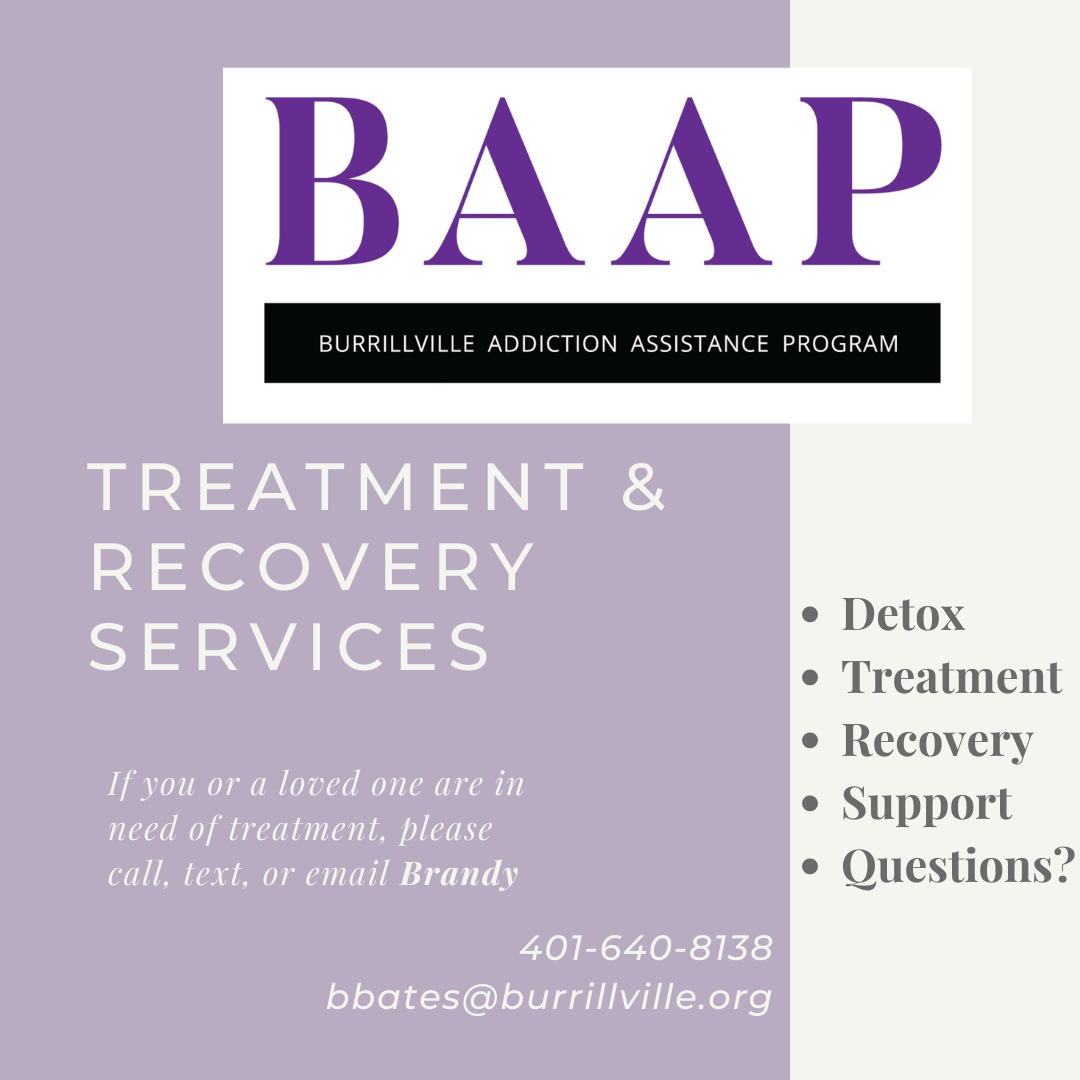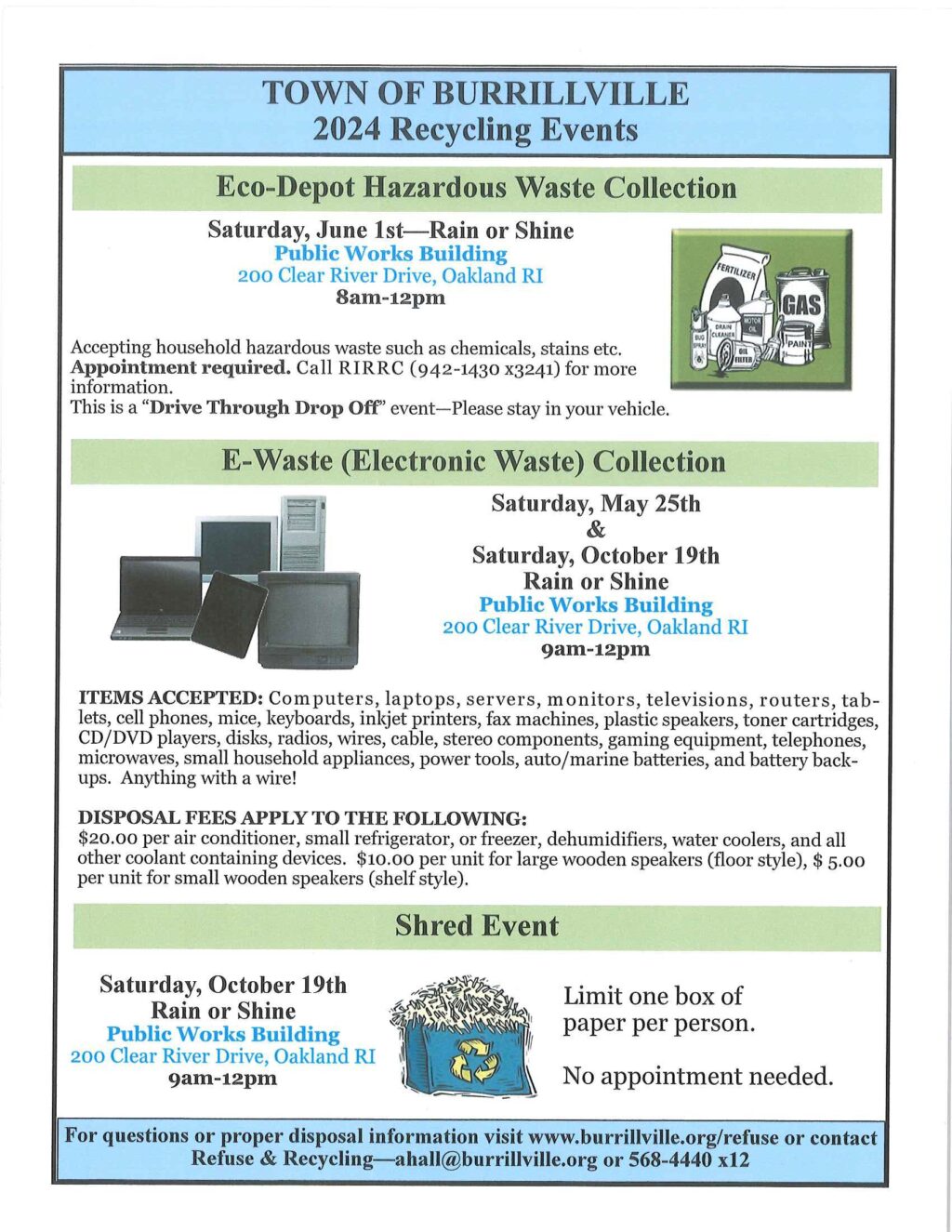
BURRILLVILLE – It is not every town where those tasked with enforcing law and order are also focused on support and compassion, but things work a little differently at one police department in the northwest corner of Rhode Island, where programs aimed at helping the community continue to expand.
The Burrillville Addiction Assistance Program – a provider of help and support for those struggling with substance abuse that operates under the umbrella of the Burrillville Police Department – has launched a new support group for the loved ones of those affected by the disorder.
Run by a licensed mental health counselor, the group held its first meeting earlier this month and has scheduled sessions through August. The informal group meeting aims to provide an outlet and guidance to those who have close friends or family members struggling with addiction.
It is an extension of an already successful program in Burrillville that supports the addicts themselves, providing a helping hand to those who hope to seek treatment.

Started in 2018 under the direction of Col. Stephen Lynch, BPD’s assistance program, and a sister program focused on prevention by working with town youth, are the only of their kind in the state. Lynch came to Burrillville in 2017 amid an overdose epidemic following a career with the Rhode Island State Police.
“I was going to too many overdose deaths in this community,” the chief explained. “I was finding myself in Burrillville homes looking for answers for families who had just lost somebody.”
BAAP coordinator Brandy Bates was hired to help those seeking treatment, with the prevention arm of the program to be run by coordinator Monica Blanchette, who organizes events and activities for youth that choose a substance free lifestyle, as well as their adult counterparts who hope to help address the larger problem within the community. Dozens of students from both the middle school and high school participate in the various events organized by Blanchette’s Burrillville Prevention Action Coalition, and at monthly meetings, older community members gather to discuss prevention-related issues.
“Monica is embedded within the police department, but more importantly, she’s embedded in this community,” Lynch said. “I attribute the success of BPAC to Monica.”
Bates, meanwhile, responds to those in crisis or struggling with use of substances such as alcohol, opioids and cocaine, helping to find appropriate treatment centers.
“We have put people literally across the country through BAAP,” Lynch said. “She does an excellent job.”
“It’s a tremendous asset that I believe we bring to Burrillville, and it’s not talked about,” he added.
The chief noted that one key to the program’s success is his department’s discretion.
“We don’t advertise people’s low moments in their lives,” Lynch said.
On a private line connecting directly to Bates, those with substance abuse disorder can take the first step in seeking help.
And now, their families also have an outlet.
“My heart always goes out to the family that is trying to get a loved one some help,” Lynch said. “That presents tremendous challenges for that particular family.”
Blanchette noted that the support group can help those looking to understand their own thoughts and emotions, and to learn how to cope family members whose behavior can bring chaos and turmoil to others.
“We’re taking this approach because yes, there’s people suffering who have substance use disorder, but there’s also a ripple effect,” Blanchette said. “Families can use support in the choices they’re making in supporting their loved ones. They need those outlets.”
Separate sessions held on select Thursday nights will offer not therapy, but rather an informal conversation and outlet to those ages 18 to 25, and then those 25 and older.
“Just developmentally, people who are between the ages of 18 to 25 are in a different place in their lives,” Blanchette explained. “I think learning to navigate things as a young adult is a little different than learning to navigate when you’re more established.”

She noted that no registration is required to attend the meetings, and the moderator and group coordinator Cheryl Lacey won’t turn anyone away. Those who have a specific topic they’d like to see addressed who might want to remain anonymous are invited to contact Blanchette, who will relay the information to Lacey.
“We’re going to see how it goes throughout the summer and see what the needs are,” Blanchette said.
The unique programs are part of a forward-thinking and compassionate approach to help those in need in the Burrillville community.
“There has definitely been an expressed need by commmunity members who are struggling with family members who struggle with substance use,” Blanchette said.
“We’re the only community in Rhode Island where you have a prevention coordinator and a treatment coordinator embedded within the police department to help with substance use and misuse,” she added.
The BAAP Support Group will meet on Thursdays, May 23; June 6 and 20; July 18; and August 1, 15 and 29, in the back conference room at Jesse Smith Memorial Library at 100 Tinkham Lane in Harrisville starting at 5:30 p.m. for those ages 18 to 25, and 6:30 p.m. for those 25 and up. The meetings are free and open to the public with no registration required.
For more information, email [email protected] or call (401) 710-7996.







There are various forms of self-medicating, including nicotine and caffeinated stimulants. Another form is food, which results in over-eating, with the vast majority of obese people who considerably over-eat likely doing so to mask mental pain or even PTSD symptoms.
I used to be one of those who, though sympathetic, would look down on those who’d ‘allowed’ themselves to become addicted to alcohol and/or illicit ‘hard’ drugs.
Yet I, albeit not in the hard-drug category, have suffered enough unrelenting ACE/PTSD-related anxiety to have known, enjoyed and appreciated the great release upon consuming alcohol and/or THC.
[As a foolish teen I’d mix the two, get ‘blitzed’, and afterwards puke my guts out. … In hindsight: where’s the pleasure in that, really, as an entire evening out socializing or ‘partying’?!]
The greater the drug-induced euphoria or escape one attains from its use, the more one wants to repeat the experience; and the more intolerable one finds their sober reality, the more pleasurable that escape will likely be perceived.
In other words: the greater one’s mental pain or trauma while sober, the greater the need for escape from reality, thus the more addictive the euphoric escape-form will likely be.
Nevertheless, neglecting and therefore failing people struggling with debilitating drug addiction should never be an acceptable or preferable political or religious option.
But the more callous politics that are typically involved with lacking addiction funding/services tend to reflect conservative electorate opposition, however irrational, against making proper treatment available to low- and no-income addicts.
Those who still consider such addiction weak-willed and even a moral crime should also keep in mind that western pharmaceutical corporations have intentionally pushed their own very addictive and profitable opiate resulting in immense suffering and overdose death numbers — indeed the real moral crime — yet got off relatively lightly and only through civil litigation.
Meanwhile, many chronically addicted people won’t miss this world if they never wake up. It’s not that they necessarily want to die; it’s that they want their pointless corporeal suffering to end.
The greater the drug-induced euphoria or escape one attains from its use, the more one wants to repeat the experience; and the more intolerable one finds their sober reality, the more pleasurable that escape will likely be perceived.
In other words: the greater one’s mental pain or trauma while sober, the greater the need for escape from reality, thus the more addictive the euphoric escape-form will likely be.
Nevertheless, neglecting and therefore failing people struggling with debilitating drug addiction should never be an acceptable or preferable political or religious option.
But the more callous politics that are typically involved with lacking addiction funding/services tend to reflect conservative electorate opposition, however irrational, against making proper treatment available to low- and no-income addicts.
Those who still consider such addiction weak-willed and even a moral crime should also keep in mind that western pharmaceutical corporations have intentionally pushed their own very addictive and profitable opiate resulting in immense suffering and overdose death numbers — indeed the real moral crime — yet got off relatively lightly and only through civil litigation.
Meanwhile, many chronically addicted people won’t miss this world if they never wake up. It’s not that they necessarily want to die; it’s that they want their pointless corporeal suffering to end.
The greater the drug-induced euphoria or escape one attains from its use, the more one wants to repeat the experience; and the more intolerable one finds their sober reality, the more pleasurable that escape will likely be perceived.
In other words: the greater one’s mental pain or trauma while sober, the greater the need for escape from reality, thus the more addictive the euphoric escape-form will likely be.
Nevertheless, neglecting and therefore failing people struggling with debilitating drug addiction should never be an acceptable or preferable political or religious option.
But the more callous politics that are typically involved with lacking addiction funding/services tend to reflect conservative electorate opposition, however irrational, against making proper treatment available to low- and no-income addicts.
Most conservatives still insist that drug addicts are simply weak-willed and/or have committed a moral crime.
Yet, western pharmaceutical corporations have intentionally pushed their own very addictive and profitable opiate resulting in immense suffering and overdose death numbers — indeed the real moral crime — yet got off relatively lightly and only through civil litigation.
Meanwhile, many chronically addicted people won’t miss this world if they never wake up. It’s not that they necessarily want to die; it’s that they want their pointless corporeal suffering to end.